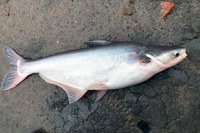Thesis defence by Truong Quynh Nhu
- https://ilee.unamur.be/events/thesis-defence-by-truong-quynh-nhu
- Thesis defence by Truong Quynh Nhu
- 2019-12-19T09:30:00+01:00
- 2019-12-19T12:30:00+01:00
- When Dec 19, 2019 from 09:30 AM to 12:30 PM (Europe/Brussels / UTC100)
- Where Auditoire L21 - rue Joseph Grafé 1 - 2ième étage
-
Add event to calendar
 iCal
iCal
Immunomodulatory potential of different herbal plant extracts on striped catfish (Pangasianodon hypophthalmus): in vitro and in vivo approaches
 Striped catfish (Pangasianodon hypophthalmus) is economically one of the most important fish species, and widely spread in several Asian countries. Many medicinal plants have been documented to possess positive effects on the immune responses of cultivated aquatic animals. However, the use of such natural products are still not very popular in striped catfish farms. Based on bibliography review data and on a survey in fish farms of Mekong Delta, 20 plants possessing potential immunostimulatory activities were selected for an in vitro study using the striped catfish peripheral blood mononuclear cells (PBMCs) and head kidney leukocytes (HKLs) models. Five plant extracts were then validated for their effects on the blood indices, humoral immune responses and disease resistance in striped catfish via oral administration. Moreover, the effects of single supply diets versus diets mixtures with Phyllanthus amarus and Psidium guajava extracts on the health of striped catfish were tested. In addition, the protein expression profile was investigated to provide a better understanding of the metabolic pathways related to immune response, antioxidation and lipid metabolism in the fish liver after oral administrated plant extracts. The different polarities of the extract solvents caused a large variation in the level of bioactive compounds of the extracts and resulted in different immune responses in the fish. The immunomodulatory effects of crude ethanol extract of P. amarus and P. guajava, as well as their fractions including n-hexane, dichloromethane, ethyl acetate, aqueous and non-tannin were therefore compared via in vitro experiments.
Striped catfish (Pangasianodon hypophthalmus) is economically one of the most important fish species, and widely spread in several Asian countries. Many medicinal plants have been documented to possess positive effects on the immune responses of cultivated aquatic animals. However, the use of such natural products are still not very popular in striped catfish farms. Based on bibliography review data and on a survey in fish farms of Mekong Delta, 20 plants possessing potential immunostimulatory activities were selected for an in vitro study using the striped catfish peripheral blood mononuclear cells (PBMCs) and head kidney leukocytes (HKLs) models. Five plant extracts were then validated for their effects on the blood indices, humoral immune responses and disease resistance in striped catfish via oral administration. Moreover, the effects of single supply diets versus diets mixtures with Phyllanthus amarus and Psidium guajava extracts on the health of striped catfish were tested. In addition, the protein expression profile was investigated to provide a better understanding of the metabolic pathways related to immune response, antioxidation and lipid metabolism in the fish liver after oral administrated plant extracts. The different polarities of the extract solvents caused a large variation in the level of bioactive compounds of the extracts and resulted in different immune responses in the fish. The immunomodulatory effects of crude ethanol extract of P. amarus and P. guajava, as well as their fractions including n-hexane, dichloromethane, ethyl acetate, aqueous and non-tannin were therefore compared via in vitro experiments.  The effects of different pure compounds isolated from P. amarus and P. guajava were also investigated in this study. Furthermore, biological activities of plant products related to inflammation are largely unknown in fish. The molecular mechanism behind the effects of P. guajava extracts on fish immune responses were also highlighted and discussed.
The effects of different pure compounds isolated from P. amarus and P. guajava were also investigated in this study. Furthermore, biological activities of plant products related to inflammation are largely unknown in fish. The molecular mechanism behind the effects of P. guajava extracts on fish immune responses were also highlighted and discussed.
More information.
Nhu will present the results of her PhD thesis, conducted in the Research Unit of Environmental and Evolutionary Biology (URBE) under the supervision of Patrick Kestemont. (The presentation will be in English)
 Institute of Life, Earth and Environment
Institute of Life, Earth and Environment
